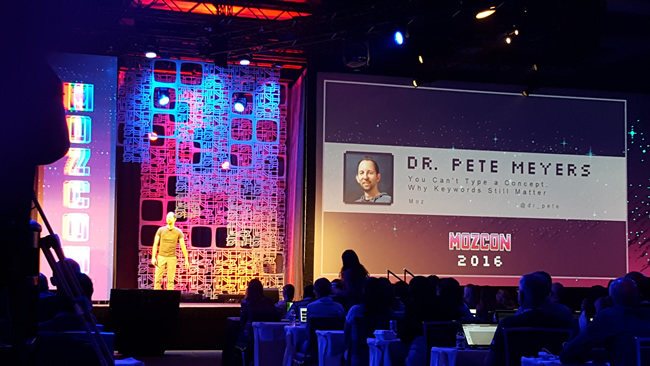DISCLAIMER: This post is written as a live blog from Mozcon. There may be typos and grammar to make my high school English teachers weep. Please excuse those … it’s a fast-paced conference with back-to-back sessions and no time for proofing or even proper writing.
Opening up day two of Mozcon 2016 is Dr. Pete Meyers. I’ve been looking forward to this session and hearing why he still thinks keywords matter.
He begins by discussing how searches are evolving and not just how search is evolving. He points out that as searchers change Google needs to adapt and then we as marketers need to adapt. He used voice search as an example. It came to the forefront in 2013 and shortly thereafter Hummingbird rolled out. Hummingbird was built do deal with voice search an more complicated queries. Then in October 2015 Rankbrain rolled out. They have since rolled it out on a larger scale and Google is becoming a “machine learning first” company.
To combat this and Google new ability to understand better user intent. To react we started believing and saying “build great content”. That’s great but to get that content someone has to enter a query. What’s in that query is still important.
He mocks us all for writing horrible title tags int he past like:
Scraf, Scarves, Wraps :: Buy Scarves Online
But now Google understands that scarf and scarves refer to the same thing. They also know that when you search “discount airfare” a page about “discount flights” refers tot he same thing.
He lists a series of examples where Google understand the context not just the content.
Where it gets more confusing is when there are multiple answers for a single query. He uses “blender” as an example that can refer to the kitchen implement, a movie or a rendering service. Doing so required deep learning. Which he’s about try to explain …
Neural Networks attempt to model the human brain. We want to input data and output a result and the network is a hidden layer in the middle. This middle layer is taught how to deal with new information. We do this by starting with the output and determining the input and teaching the machine to work its way forward. The machine then learns how to teach itself.
Google is using this. They offer a udacity course on it. This course basically defines how machine learning could be used at Google as “taking two inputs (query and page) and determining how likely they are to be releant”.
He brings up Tensorflow – a free machine learning offering from Google as an exaple that his is an area they are pushing heavily.
He points out that Rankbrain is not query translation (which is a different thing). It’s not an adjustment of our query but a quest for relevance.
We Have To Adapt
Using Moz’s Keyword Explorer in the example. They have an option to group with low lexical similarity. With this you can then select groupings of phrases (concepts). He then suggests picking an ideal phrase for each concept. This allows for far more natural language written. This also allow for targeting a much larger grouping of phrases. So we have to …
Gather Our Keywords
Group your terms
Generate Ideals
He again pitches Keyword Explorer a bit and points out that they include a potential score that will help guide your conclusions using machine learning against machine learning.
At times there’s a 4th G and that’s Gaps. There will be times we’re missing data bu as a principle this strategy will capture larger groupings that we otherwise would.
Now he answers “why not just write for people?” While that’s great he points out that Google is only emulating humans an isn’t human. We also don’t know all the things humans would search or do without research – we only know what we would.
He reminds us voice search is our natural state. Until search engines s we all asked in questions and kids today do this naturally so we need to unlearn the limitations we’ve put on ourselves. Some won’t and they will not survive.
In the Q&A he notes that related questions is a good place to look for relevant content and even if it’s not relevant it may relate to where they believe a user will end up a few stages down the road.
